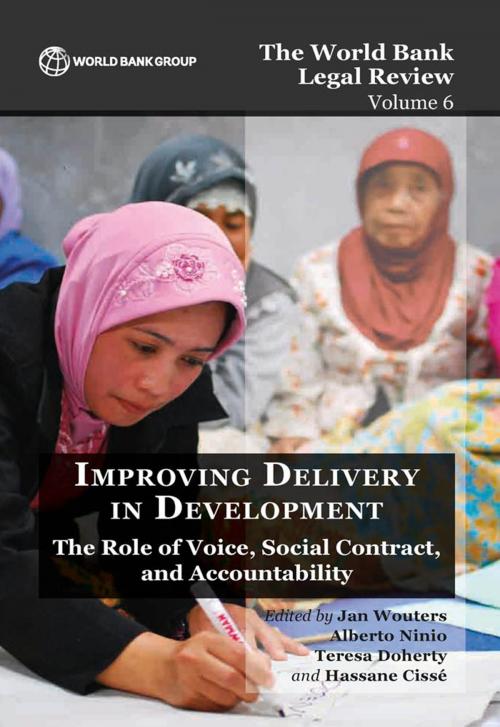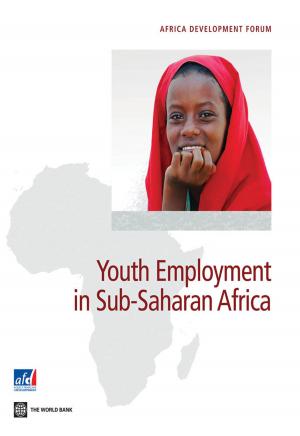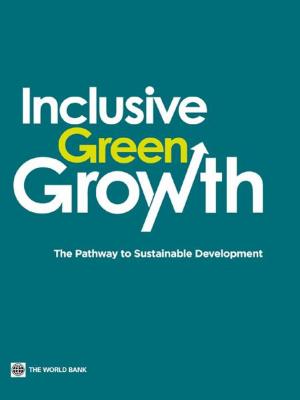The World Bank Legal Review Volume 6 Improving Delivery in Development
The Role of Voice, Social Contract, and Accountability
Nonfiction, Reference & Language, Law| Author: | ISBN: | 9781464803796 | |
| Publisher: | World Bank Publications | Publication: | March 9, 2015 |
| Imprint: | World Bank Publications | Language: | English |
| Author: | |
| ISBN: | 9781464803796 |
| Publisher: | World Bank Publications |
| Publication: | March 9, 2015 |
| Imprint: | World Bank Publications |
| Language: | English |
Many developing countries have the capacity to develop broad development policy directions and formulate development programs that are logical and consistent, but these do not obtain the desired or targeted results because of challenges in the delivery system. It is increasingly apparent that development efforts must be carefully crafted and targeted in the right way to achieve the most effective results in an efficient manner. Recent literature in development studies evidence the important role of 'delivery' in actualizing positive and efficient development impact. Improving delivery and development impact requires a multidisciplinary approach. Development practitioners devoted to rule of law and justice must conjoin their efforts, concepts, tools and knowledge with experts from various disciplines so as to shape a delivery system that adds economic and social value to ultimate beneficiaries of development. In the foregoing light, the book brings together the diverse perspectives of development experts, international lawyers, academics, researchers, legal practitioners, public and civil servants, and other professionals, in order to explore the values of voice, social contract and accountability, and thereby address the following issue: How can law and justice tools, concepts and knowledge - when anchored in values such as voice, social contract and accountability - shape a delivery system that adds economic and social value to ultimate beneficiaries of development? The book revolves around a discussion of the three values of voice, social contract, and accountability as they relate to the role and function of law, rule of law, justice, judicial systems and other related areas, in delivering development impact. Additionally, the book departs from the legal and includes other multidisciplinary approaches in its discussion of the three values and their impact on delivery in development. The range of issues covered by the book include those relating to human rights, government policy, urban development, resource management, gender, social rights, economic reforms, financial empowerment, opportunity creation, governance, urban law, sustainable development and anti-corruption.
Many developing countries have the capacity to develop broad development policy directions and formulate development programs that are logical and consistent, but these do not obtain the desired or targeted results because of challenges in the delivery system. It is increasingly apparent that development efforts must be carefully crafted and targeted in the right way to achieve the most effective results in an efficient manner. Recent literature in development studies evidence the important role of 'delivery' in actualizing positive and efficient development impact. Improving delivery and development impact requires a multidisciplinary approach. Development practitioners devoted to rule of law and justice must conjoin their efforts, concepts, tools and knowledge with experts from various disciplines so as to shape a delivery system that adds economic and social value to ultimate beneficiaries of development. In the foregoing light, the book brings together the diverse perspectives of development experts, international lawyers, academics, researchers, legal practitioners, public and civil servants, and other professionals, in order to explore the values of voice, social contract and accountability, and thereby address the following issue: How can law and justice tools, concepts and knowledge - when anchored in values such as voice, social contract and accountability - shape a delivery system that adds economic and social value to ultimate beneficiaries of development? The book revolves around a discussion of the three values of voice, social contract, and accountability as they relate to the role and function of law, rule of law, justice, judicial systems and other related areas, in delivering development impact. Additionally, the book departs from the legal and includes other multidisciplinary approaches in its discussion of the three values and their impact on delivery in development. The range of issues covered by the book include those relating to human rights, government policy, urban development, resource management, gender, social rights, economic reforms, financial empowerment, opportunity creation, governance, urban law, sustainable development and anti-corruption.















